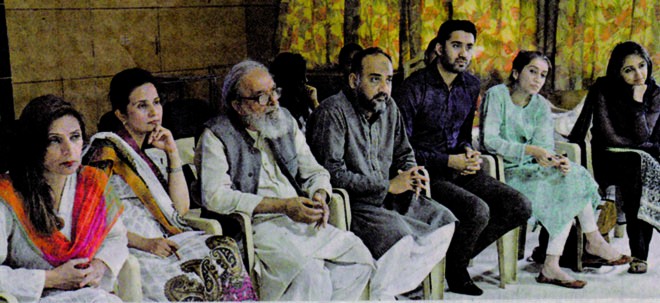
The woman was a Sikh, the man a Muslim; both running for their lives. Six decades later, I still remember those incidents vividly

It was a cold February morning. My father was in our garden as usual when a portly, middle-aged woman in a crumpled shalwar kameez and faded dupatta turned up at our door, stood silently for a minute, and when she saw my mother emerge from an inner room, asked if there was any work she could do.
"I am good at embroidery, ammi," she said, "I can put a nice border on that silk piece you have in your hands…"
True, my mother had bought, the previous day, a length of white Kashmiri silk, more because it was offered cheap and was good value for money, but hadn’t decided what to do with it. It was long enough for a sari…
"I will sit here, on your veranda and work -- karaa lo (please get it done)," she pleaded. Something in her voice was very touching.
"How much?" my mother asked.
"Pay me three rupees, ammi," the woman said.
She squatted in a corner of our veranda, pulled out a small pouch of coloured threads and needle, and set to work. This was in Delhi, in 1948. I was not yet seven, and watched her create a beautiful border of tiny buds -- in pink and blue -- along one edge of the silk, and across the pallu by sundown. I still have a piece of that silk.
She collected her three rupees, lingered for a moment gazing longingly at our lush garden, and said, to no one in particular, "In Lahore, we had a big garden with many fruit trees. My children never drank water. Only milk, fresh from our cows…." And she began to cry. She had walked from Lahore to Delhi, during the post-partition riots, leaving behind a large bungalow, and fled for her life. She had no idea where her husband and two sons were.
My father plucked the largest ripe papaya from our tree and held it out to her. She took it, crying uncontrollably. As a child I did not understand what was going on; but two days later, I woke up to hear my parents arguing loudly. Apparently, someone had knocked urgently on our door late at night and my father had opened the door to find a trembling, bearded man begging to be let in as a mob was chasing him.
"Bachao," he pleaded, "Maar daalenge." (Save me! They’ll kill me).
My father let him in, gave him a blanket and let him sleep in the back room. By morning, he was gone. So was the blanket. My mother was furious -- it was her new blanket; she also chided my father for letting a stranger in at night, when the city was racked by communal riots.
"But he was a human being in distress", my father argued.
The woman was a Sikh, the man a Muslim; both running for their lives. Six decades later, I still remember those incidents vividly -- and six decades later, we are still glowering at each other across the border. Though people to people, we have no animosity -- my three visits to Pakistan left only beautiful memories of effusive hospitality and warmth (although the process of getting a visa was so stressful that I hesitated and declined when a fourth invitation came last year). I am part of a PSAARC (People’s SAARC movement) in India that wants to take the spirit of South Asian bonds forward through non-official, people-to-people linkages. Inaugurating the South Asian games in Guwahati (India) on February 6, Prime Minister Modi said he was all for stronger bonds among SAARC countries.
Tens of thousands of citizens on both sides of the border believe that both countries need to divert their scarce resources to fighting internal poverty rather than increasing military expenditure. Terrorism is not just a regional problem -- it is global; if Europeans can walk freely across Schengen borders (despite the ravages of two World Wars), if the Berlin Wall could be brought down by citizens wanting unification, if geo-political demarcations are becoming obsolete thanks to global networking (via internet and technological sophistication), why are official responses still based on skepticism rather than trust?
Jawaans at Wagha exchange sweets, academics in Lahore join in Diwali festivities, and Muslims have a respected role in a Hindu temple ritual in Karnataka (the festivities cannot start till the Muslims join in).
Narendra Modi made an unscheduled stopover in Lahore. But a citizen cannot, in either direction. When a delegation of Pakistani educators visited India in 2013, a person in the audience at Bengaluru said, "Array, they look exactly like Indians, even speak the same language! And the delegation has so many women!"
See what I mean?
To a generation born much after independence, a neighbouring country -- one that shares roots, families, languages and customs with Indians, remains a closed book. Not the best of circumstances for regional development and peace, when Europe, despite differences, is knitting together.
The Indo-Pak jugalbandi recital that I was a part of, in Karachi, drew an encore and warm reviews. Palestinian and Jewish teenagers are today training together for the Jerusalem marathon (as part of Runners without Borders). Why not Artistes without Borders? Those who sing together, live together in harmony. That is why I volunteered for the PSAARC initiative.
We do not stop eating because of the danger of salmonella. Should we stop friendship initiatives because of stray terrorist threats? Perhaps, there are Pakistani groups that would be interested in PSAARC, for improving relationships (and even fighting terrorism). The bottom line is Aman ki Asha, as the phrase goes…